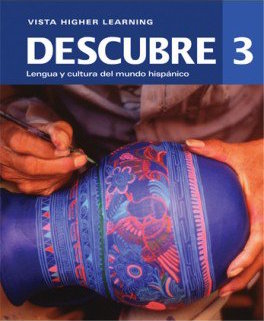
All Solutions
Page 74: Despues de leer
You could answer:
*El protagonista de esta historia se llama Osvaldo.*
The protagonist of this story is called Osvaldo.
You could answer:
*Cuando está frente al televisor por primera vez, se queda hipnotizado y entregado al sortilegio de las imágenes.*
When he is in front of the TV for the first time, he is left hypnotized and surrendered to the magic of the images.
You could answer:
*Mientras Osvaldo mira la televisión, la madre friega ollas y sartenes en la cocina.*
While Osvaldo watches TV, his mother scrubs pots and pans in the kitchen.
You could answer:
*Cuando la madre va a buscarlo, la pantalla está vacía.*
When his mother goes back for him, the screen is empty.
You could answer:
*Osvaldo piensa que la televisión le dijo “querido”.*
Osvaldo thinks the TV called him “dear”.
You could answer:
*Según Osvaldo, la televisión le dijo “querido”, pero yo creo que debe haber visto a algún personaje o persona en un programa decirlo y pensó que era para él.*
According to Osvaldo, the TV called him “dear”, but I think he must have seen some character or person on a show say it and thought it was for him.
You could answer:
*Sí, creo que es importante, porque si la madre no se olvidara de él frente a la televisión, tal vez le estaría dando atención y cariño, y Osvaldo no esperaría que la televisión le dijera que lo quiere. Si hubieran sido sólo unos minutos, Osvaldo sólo se habría entretenido un rato.*
Yes, I think it’s important, because if his mother hadn’t forgotten him in front of the TV, she may be giving him attention and love, and Osvaldo wouldn’t wait for the TV to tell him it loves him. If it had been only a few minutes, Osvaldo would’ve only been entertained for a while.
You could answer:
*Sí, creo que puede ser adictiva para los niños y para los adultos. La adicción a la televisión puede hacer que pienses que lo que pasa en la televisión es el mundo real, y te olvides de lo que pasa en tu vida.*
Yes, I think that it can be addictive for children and for adults. TV addiction can make you think that what happens on TV is the real world, and forget about what happens in your life.
The timetable reads:
|6:00 |6:30 |7:00 |8:00 |9:15 |10:00 |
|–|–|–|–|–|–|
|**Tricks for school**: How to make a good impression with little effort | **Living nature**: Documentaries| **My Latin family**: Fun comedy about a young American who goes to Mexico as an exchange student|**Police stories**: Thieves, crimes and accidents |**Good and curious**: Alternative news program that presents good and fun news from all over the world |**Classic cartoons**: Get to know the cartoons your parents watched |
You could answer:
*Queremos que cambien el programa de historias policiales, porque muestra escenas demasiado violentas para que vean los niños.*
We want them to change the police stories program, because it shows scenes that are too violent for children to watch.
You could answer:
*Deben seguir en la programación los programas educativos, como los documentales y las buenas noticias.*
Educational programs like documentaries and good news must stay on the timetable.
You could answer:
*Se pueden incluir programas de arte o de música, para que los niños aprendan a desarrollar sus habilidades.*
Art or music programs can be included, so that children can learn to develop their skills.
You could answer:
*Pondría el documental de naturaleza viva a las 9:15, y el noticiero a las 6:30, para que los niños estén más despiertos y le presten más atencion al documental.*
I would move the living nature documentary to 9:15, and the news program to 6:30, so that kids can be more awake to pay more attention to the documentary.
*Un día, estoy leyendo un libro en la casa de mi abuela, esperando que sea la hora de ir a mi casa. Mi hermano tiene tres años, y está en el piso jugando con un auto de juguete. De repente, mi abuelo abre la puerta de la casa y asusta a mi hermano, y él salta al sofá, donde yo estoy sentado. Del susto, mi hermano me golpea en la cara con su auto, y se ríe del golpe.*
One day, I’m reading a book at my grandmother’s house, waiting for the time to go home. My brother is three years old, and he’s on the floor playing with a toy car. Suddenly, my grandfather opens the door to the house and scares my brother, and he jumps on the sofa, where I am sitting. From the fright, my brother hits me on the face with his car, and laughs at the punch.

